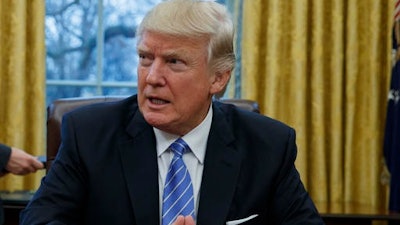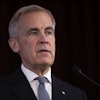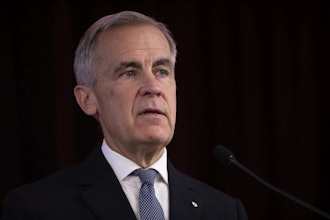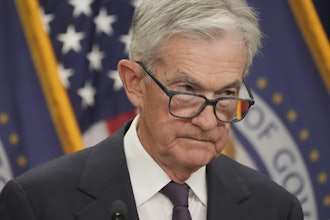
WASHINGTON (AP) — The Trump administration has submitted a vague set of guidelines to Congress for renegotiating the North American Free Trade Agreement with Mexico and Canada, disappointing those who wanted a major overhaul of a decades-old trade deal that Trump described as "disaster" during the presidential campaign.
In an eight-page draft letter to Congress, acting U.S. Trade Rep. Stephen Vaughn wrote that the administration intends to start talking with Mexico and Canada about making changes to the pact, which took effect in 1994. Trump and other critics blame the agreement for wiping out U.S. manufacturing jobs because it allowed companies to move factories to Mexico to take advantage of low-wage labor.
The letter spells out few details and sticks with broad principles. But it appears to keep much of the existing agreement in place, including private tribunals that allow companies to challenge national laws on the grounds that they inhibit trade — a provision that critics say allows companies to get around environmental and labor laws.
The draft also contains some provisions that were part of the Trans-Pacific Partnership, a 12-country Asia-Pacific trade agreement negotiated by the Obama administration but rejected by Trump for possibly hurting U.S. workers.
"We've got a long ways to go," said Ohio Democratic Sen. Sherrod Brown. "President Trump made big promises to working people in Ohio, and I'm ready to work with him to deliver on those promises or hold him accountable if he doesn't."
Commerce Secretary Wilbur Ross confirmed in an interview on CNBC that the draft letter had come from the administration. He told CNBC that the administration wants to update how products qualify for tariff-free status, noting that some auto parts made outside the United States, Canada and Mexico can now qualify for this special status due to the agreement's outdated rules.
"It is a backdoor way for non-NAFTA goods to take advantage of NAFTA," Ross said.
But not everyone viewed the draft letter as protecting workers.
NAFTA critic Lori Wallach, director of the left-leaning Public Citizen's Global Trade Watch, called the letter "a punch in the face."
If it represents the president's plan for a revamped NAFTA, she said, "he will have broken his campaign promises to make NAFTA better for working Americans and have a deal that cannot get a majority in Congress."
But Gary Hufbauer, a senior fellow at the Peterson Institute for International Economics, which advocates free trade, said the letter leaves open the possibility that the Trump administration can take a tougher position once talks with Canada and Mexico begin.
"The language is soft. It's very diplomatic," he said. "But it does have the potential of being an umbrella for very hard-hitting demands."
For instance, the letter said the president wants to revamp rules on government contracts to allow the U.S. government to insist that U.S. contractors do more to "buy American" while nudging the Mexican and Canadian governments to buy more U.S. products, too.
Texas Republican Rep. Will Hurd, whose district runs more than 800 miles along the border with Mexico, welcomed administration calls for NAFTA to be updated to reflect the rise of e-commerce in the years since the pact was negotiated. The U.S. will seek commitments from Mexico and Canada not to impose customs duties on digital products.
Criticizing NAFTA was a winner on the campaign trail. But many U.S. manufacturers have built complicated supply chains that cross NAFTA borders and worry that a rewrite of the deal will disrupt their operations. The letter states that a goal of new talks is to boost manufacturers' profits "within the trading bloc."
U.S. farmers also have enjoyed increased access to the Mexican market through NAFTA, a benefit an amended agreement would look to expand.
The vague draft may reflect a Trump administration still figuring out its trade priorities.
Outside of the president's own fiery rhetoric, congressional staffers have said it's unclear precisely which administration officials are setting the agenda on trade.
There is Commerce Secretary Wilbur Ross, a billionaire investor whom Trump has hailed as a "killer" negotiator.
But the president also created the National Trade Council led by the economist Peter Navarro, who has talked up border taxes in hopes of bringing factory jobs back into the United States.
And then there is Robert Lighthizer, the lawyer awaiting Senate confirmation as U.S. trade representative, the post officially responsible for leading talks about a new pact.
White House spokesman Sean Spicer declined to discuss the draft until Lighthizer is in place.
"Our goal is to get Robert Lighthizer appointed as the next ambassador and U.S. trade representative," Spicer said.





















